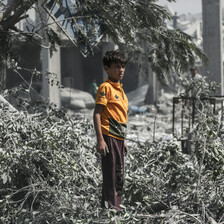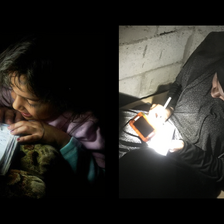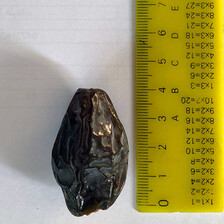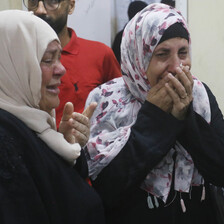The Electronic Intifada 28 August 2025

The author with Mohammed Qraiqea (wearing press jacket). (Image courtesy of the author)
I can picture Mohammed standing in the front row of the summer camp choir, singing softly. I can still recall him: a beautiful, well-mannered, shy child.
It was a summer afternoon, and the final performance was being held in the backyard of a kindergarten that every year transformed into a camp for children during the school holidays.
Roughly the same age as Mohammed, I was standing beside the stage as the host of the event, watching him from just a few steps away.
Rows of children were lined up shoulder to shoulder. When the first words of the anthem rose, his lips moved gently, almost hesitantly, as if he was afraid to sing too loudly. Yet his voice, though soft, carried something steady.
Everyone stood up and joined their voices together, reciting the anthem in unison:
The Truth is mobilizing its troops,
preparing for the decisive moment.
So line up the lion-like battalions,
and with it, crush the state of falsehood.
At that moment, as Mohammed’s voice merged with all of ours, I had the sense that this child, reserved and modest, was carrying depths we could not yet name.
Transformation
I first met him during that summer camp in the Shujaiya neighborhood of eastern Gaza City when we were children. He was around 9 or 10 years old, and we ended up in the same group of children and participated in activities together during the two-week camp.
Our paths would cross again several more times during our middle and secondary school years. We were involved in various student activities together: cultural competitions between neighborhoods, regular gatherings of students memorizing the Quran in local mosques, and beach trips and community-based sports events.
We distributed educational magazines among our classmates, joined demonstrations whenever the city was raided or a martyr fell – particularly during the fervent protests and gatherings of the second intifada that defined our teenage years.
Over time, I watched him transform from a shy boy into a confident young man, and finally into a professional journalist who spoke Gaza’s truths with clarity and conviction.
I knew Mohammed Qraiqea for 25 years before he was murdered in a targeted Israeli strike on 10 August along with his Al Jazeera colleagues Anas al-Sharif, Ibrahim Zaher, Mohammed Nofal and journalists Moamen Aliwa and Mohammad al-Khaldi and bystander Saad Jundiya.
I knew him as a radiant orphaned child, a bright and modest teenager and an active university student.
I knew him at the height of his success and fame as one of the brightest and bravest journalists documenting Gaza’s genocide, working tirelessly to tell his people’s stories.
I also knew him as a friend and as a colleague through my role as spokesperson for the Gaza Municipality. He was a companion in countless moments.
Modesty and sorrow
If I had to distill Mohammed into one word, it would be modesty. Modesty first, sorrow second.
We used to call him by many names: “O handsome one, O Abu Qraiqea, O ihliwa [sweet one], O Abu Zeena, O the blossom of Shujaiya.” He would always answer with his unforgettable smile: shy and half-hidden, his green eyes lowering for a moment as though embarrassed by the praise and attention. But it carried a warmth that lit up his whole face.
Mohammed lost his father during his early primary school years; children raised in the absence of one of their parents are considered orphans in our culture.
He was very close to his mother, Ne’mah, and their bond shaped his character. Both his mother’s encouragement and the hardship of growing up without a father gave him an ambition beyond his years, and a tireless energy to work, to achieve, to prove himself.
The sorrow of being fatherless never left him, but he wore it quietly.
Mohammed was made of a rare blend: the gentlest modesty and the deepest sorrow, both qualities cloaked in the quiet dignity of enduring wounds. This shaped his personality, his way of life, his outlook and his daily dealings.
He was a dedicated and humble young man who knew how to work with both grace and precision, how to find the story, write it, publish it, speak it and broadcast it. It was as if God had created him to be the voice of a people facing annihilation, armed only with the truth against the machinery of death and destruction.
His modesty showed in small things: He never sought attention, never claimed credit.
His sorrow, too, was quiet, yet profound. In one conversation, he spoke about how intimately he knew his mother, who was among those killed during Israel’s invasion of Al-Shifa Hospital in March 2024.
He said he could identify her just by the dress she wore. She owned only a few, and he knew each one by heart. “I am her son. I slept beside her, laughed with her, cried with her,” he told me. “I know her by her soul, by her body, by her dress.”
Tenderness and grief
That mixture of tenderness and grief, of closeness and loss, defined him.
I also remember his slender frame and handsome face in front of the camera, standing firm despite his psychic wounds, waiting for the anchor’s question so he could speak our griefs and hopes in a tender, steady and clear voice – without exaggeration or minimization.
I would tease him as he was waiting to go live and stand behind the camera, trying to make him laugh. He would blush, his cheeks warmed by shyness and elegance.
Then the question from the studio would come, and his whole demeanor would change. His face would brighten, his eyes would shine. He became a mountain, a hope, a pure voice that knew exactly how to say what the image alone could not convey.
I once encouraged him to promote himself more, to use his social media platform to gain more followers.
He told me he did not seek fame, only reach. When I said fame could help him reach more people, he replied that he preferred to remain the son of Ne’mah, the humble woman. He wanted people to always see him as her son, not as a celebrity. For him, keeping her name alive was far more important than making his own.

Mohammed Qraiqea as a shy boy and as a confident young man. (Via Facebook)
Since Mohammed’s assassination and in the days that followed, I have been overcome with the urge to write about him, yet all I could produce were words heavy with grief and lament.
I remain trapped in our last short chat, an hour before he was killed, when we had agreed to meet the next day. I keep replaying those plans in my head: We had talked about seeing each other, unaware it would never happen. That ordinary promise of “tomorrow” now feels unbearable, suspended in time, forever unkept.
Still, I wrote this about him, because I believe now is the time to speak of martyrs, to learn from them what it truly means to choose a life – and a death – of honor.
Amid this ongoing genocide, there is no space to mourn, no pause to breathe. Each loss is followed by another, and we carry our sorrow silently, saving our tears for a future when we are allowed to feel the weight of what has been stolen from us.
The tears and mourning are postponed to another time, when we will weep at length for young men like Mohammed Qraiqea – the best, the purest, the noblest among us.
We weren’t exaggerating or flattering when we would tell Mohammed: “Shujaiya is blessed to have you. Gaza is blessed to have you. Palestine is blessed to have you.”
We were truly blessed to have known him and to have shared his company, a blessing we could never have had enough of.
Rest in peace, habibi Abu Zeena.
Asem Alnabih is the spokesperson for Gaza Municipality, an engineer and PhD researcher currently based in Gaza City. He has written for many platforms in both Arabic and English.





